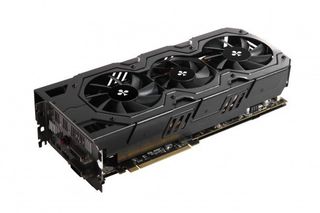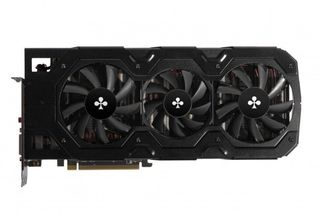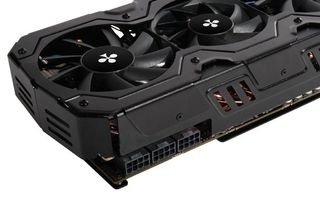Club3D Radeon HD7990: Now this is what we call graphical overkill

Wanna see something cool? Course you do. This is the Club3D Radeon HD 7990. Ain't she a beauty? This is Club3D's answer to Nvidia's GTX 690, and like the competition this is a dual-GPU card sporting the best GPUs of this generation in a frankly ludicrous configuration.
I mean, just look at it. That HD7990's fricking vast.
But then it's going to have to be to house the sort of cooling the Club3D engineers have to stick in this behemoth of a card to keep those hot and heavy Tahiti XT GPUs running at a temperature that wont turn the rest of your PC to so much molten slag.
From what those engineers say though their cooling array sounds like it's doing an admirable job, keeping the GPUs chilled to the tune of around 65ºC under full load. That's rather impressive when you consider there's effectively a pair of HD 7970's sharing a single slab of PCB and just three fans.

As is the way with dual-GPU cards though the cores are slightly clocked down compared with the full single card versions. The Tahiti XT GPUs in Club3D's HD 7990 are running at 900MHz compared with the 1GHz core speed of the HD 7970 GHz Edition.
If this still isn't enough raw graphical grunt for you, however, Club3D has stuck in a dual bios switch with an 'enthusiast' setting. That'll boost your GPUs up to 925MHz a piece. You mad fools...
PC Gamer Newsletter
Sign up to get the best content of the week, and great gaming deals, as picked by the editors.
Now at over £700 the HD 7990 is not going to be a cheap option, and in fact you'd arguably be better served opting to just buy two HD 7970 GHz Edition cards, but I'm going to wait to give my final verdict when my card arrives later today.


Dave has been gaming since the days of Zaxxon and Lady Bug on the Colecovision, and code books for the Commodore Vic 20 (Death Race 2000!). He built his first gaming PC at the tender age of 16, and finally finished bug-fixing the Cyrix-based system around a year later. When he dropped it out of the window. He first started writing for Official PlayStation Magazine and Xbox World many decades ago, then moved onto PC Format full-time, then PC Gamer, TechRadar, and T3 among others. Now he's back, writing about the nightmarish graphics card market, CPUs with more cores than sense, gaming laptops hotter than the sun, and SSDs more capacious than a Cybertruck.
Most Popular



